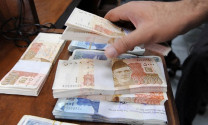From risk to resilience: Telenor chief reflects on journey to profitability
Believes future holds more opportunities given developments in the sector

With 36.6 million subscriptions including 3.5 million 3G users as of March 2015, the company enjoys a top position but it was not without challenges. PHOTO: FILE
“The business has been quite resilient. So, I am not so concerned about those kind of issues,” Telenor Pakistan Chief Executive Officer Michael Foley said of Pakistan’s business environment in a recent interview, reflecting back on the highs and lows of the company’s 10-year journey towards profitability.
The Pakistani subsidiary of Norwegian telecom giant Telenor Group, which entered the market in 2005, has become one of the highly profitable telecom firms. The company, according to its chief, grew year after year and has been reporting higher revenues for the last three quarters.
Revenues increased by 43% to Norwegian kroner (NOK) 2 billion in the January-March quarter of 2015 compared to NOK 1.4 billion in the same quarter last year. This translated into 6.6% of the group’s overall revenue.
Earnings before interest, taxes, depreciation and amortisation (EBITDA) margin also increased by six percentage points to 44.8% in the quarter – this margin is a key measure of a telecom firm’s financial performance.
“The glass is more than half full in Pakistan. When you look at the opportunities and the risks, the equation is very good,” Foley, dressed in Pakistani attire, wearing Telenor’s logo close to his heart with Pakistan’s flag in his cufflinks, told The Express Tribune in the company’s Karachi office.
There was and is still a geopolitical risk when looking at Pakistan from outside, the CEO says, as people have a very biased view based on what images the western press and sometimes the local press project to the rest of the world.
“It takes an investor to look beyond the headlines, do some factual research about the market and its opportunities to actually come in and invest,” the Canadian said, referring to the company’s decision to buy a licence and spend $2.3 billion over the last 10 years in the country.
Responding to a question, Foley said there are always challenges in every market. For example, there have been issues, conflicts with governments, natural disasters, earthquakes and massive floods, yet Pakistan remains resilient. “We, probably, borrowed that [resilience] from the Pakistani context in which we operate.”
With 36.6 million subscriptions including 3.5 million 3G users as of March 2015, the company enjoys a top position but it was not without challenges.
In 2010, a Norwegian newspaper reprinted blasphemous cartoons that were drawn earlier by a Danish cartoonist, which sparked calls of boycotting Telenor.
In 2013, it came under severe criticism after its former chief said it was easier to buy a Kalashnikov than a mobile phone SIM, criticising government’s restrictions on buying more than five SIMs per CNIC.
The overall telecom sector also faced regulatory challenges ranging from restriction on sales channels to verification of SIMs. The government even said it would book the CEO of telecom firms if any illegal SIM is traced back to their network – this is no more a challenge, courtesy recent biometric verification of the entire telecom user base.
One of the biggest challenges is that of taxation. For every recharge of Rs100, around Rs30 goes to taxes, making Pakistan the fourth highest tax jurisdiction in the world for telecom services, something Telenor has been vocal about for years.
However, Foley is hopeful that good times are coming ahead given what has happened in the past 18 months.
The new telecommunication policy is about to come, there has been extensive 3G rollout, biometric verification of all SIMs has been completed and the universal service fund has been revived. The government is likely to sell more spectrums this year.
“We have not always mutually agreed but we have always had a voice and an influence over policies,” Foley said. “The scenario overall is positive. I am not feeling over-regulated.”
The writer is a staff correspondent
Published in The Express Tribune, June 1st, 2015.
Like Business on Facebook, follow @TribuneBiz on Twitter to stay informed and join in the conversation.


















COMMENTS
Comments are moderated and generally will be posted if they are on-topic and not abusive.
For more information, please see our Comments FAQ